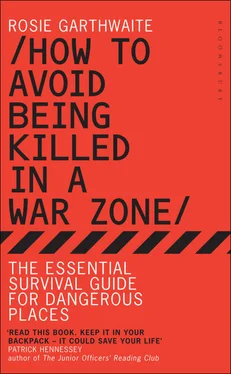You are at your most vulnerable on the way into a country because you are unfamiliar with the procedures, the language and the culture. Here are some useful tips.
Know who is picking you up.Get their phone number and call them in advance for advice on what you need to do to smooth your way into the country. (I remember asking my boss whether my pick-up would bring my body armour, and having a fit when he shrugged and said, ‘You’ll find out when you get to the airport.’ My next stop was Baghdad.) Take the initiative and make sure you know all the answers before you go.
Arrange a meeting place and, if necessary, a code wordto identify that the right person is picking you up. Get their phone number and give them yours.
Take all essentials in your hand luggage – some clothes, a washbag, valuables and your grab bag (see Grab Bag YOUR GRAB BAG MUST INCLUDE…
).
Find someone friendly enough to be your temporary translatorso they can help you through any problems on the journey. The person who smiles at you when you struggle to buy a ticket will usually work.
Leaving a country is another vulnerable time because you tend to let your guard down. It might sound strange, but you need to know your way out before you go in.
Call people who are already there and discover your options. You need to find out the following things:
What are the emergency and medical evacuation procedures(often shortened to medevac)? Your embassy will know. Your travel agent will also know. And, if you have one, your employer should know. If they don’t, then make sure they do before you go.
I’ve frequently found the embassy rather unhelpful and unreliable when it comes to planning for a possible evacuation. Both ‘Medevac’ and ‘Emergency Evacuation’ should be sorted out prior to deployment. It’s always worth a call to the insurers to find out where the nearest airport would be if they had to come and get you.
Chris Cobb-Smith , security expert
What are your alternative routes outif the road, railway, airport or sea route you arrived on is closed down? You need to be informed in order to make a decision if everything goes wrong.
On my first trip to Iraq with Al Jazeera I was asked to take a large amount of money with me because we needed to put a down-payment on our bureau. Suddenly I was a walking ATM for any criminal who managed to find out. It was a dangerous situation in which to be placed.
My friend Nick Toksvig, senior news editor for Al Jazeera English, recalls the perils of carrying huge wads of cash: ‘The Iraq war of 1991 saw the old Iraqi currency fall prey to hyperinflation. Suitcases of bills were required to pay even for small things. Paying local fixers was like taking part in some massive Las Vegas poker tournament. Be careful not to flash the money at any stage.’
Don’t tell anyone in your destination countrythat you will be carrying large amounts of cash. If it slips out at the wrong time to the wrong person, you will become a target.
When it comes to your daily cash, carry just enough for the day and try to spread it around your body. Also carry a credit card for emergencies.
Former EU and UN staff member Mary O’Shea has some good ideas for things you can do in case of a mugging or car-jacking: ‘I have been robbed twice in my life. Once in the Paris Métro and once in an airport in Cameroon. In Paris it was a clever knife slit along the bottom of my bag in a crowded carriage. Presumably another bag was positioned underneath to catch my things. In Cameroon it was a good old-fashioned set-up – electricity cut, surrounded by men, etc. In terms of a confrontation, I would advise you to carry two wallets – one being a dummy wallet that can be handed over with a small amount of cash inside and some out-of-date cards.’
Keep around $1000 plus a few hundred in local currencyin your grab bag at all times.
Cheque books, backed by a cheque card, can be used in many countries.
Be especially cautious at ATMsand coming out of banks and money exchange places.
Carry some low-denomination notes for tipping.Dollars will work for the first day or two until you can get your money changed. Store this money separately from your main cash so you are not flashing it every time you open your wallet.
Always carry a list of contact numbers (sometimes known as a call sheet). It should include your hotel, your embassy, the local hospital, the airport, police, colleagues, local contacts, your next of kin and whoever it is you are calling into back at base, wherever that may be. This information might be in your phone, but remember that you could lose your phone or it might be stolen.
Make sure you have a point person – someone back at base, be it a colleague from your company, a family member or friend, who will be responsible for noticing when you don’t call in. But remember that you are responsible for making sure you can call. This means always taking your phone and charger, or a satellite phone if you are likely to be out of network coverage.
Give your point person some idea of your itineraryat all times and let them know if it changes.
Give your emergency numbersto your point person.
Ensure you have two working and charged methods of communication.I take my UK phone, a back-up UK phone (both with all numbers), a cheap mobile for use with a local SIM card, and always a satellite phone. If working with the media, ensure that the M4/BGAN can also be used as an alternative. Do make sure your SIM card has enough cash on it if it is pre-paid, and always carry a mobile phone charger: car chargers can be life-savers, as can wind-up phone chargers, or solar-powered ones that sit on top of your backpack. Also make sure everyone in your team is aware of how to work your communications system – whether it be a phone, e-mail, VHS two-way radio or a satellite mast – so that they can step in during emergencies.
The call-in should be a rigorous procedure – according to area or threat – every three or six hours. In the event that the call is not received, the procedure should be equally rigorous: no call for an hour – alert people that there may be a problem; no call for two hours – start emergency procedures.
Chris Cobb-Smith
Choose communications equipment you understand. Simple is usually best because a phone that has a hundred gadgets will simply eat up the battery. It could also get you into trouble as people might assume it is something more exciting than it is – some sort of new-fangled spy system or secret camera. It is less likely to get stolen if it’s similar to what everyone else in the country has.
My friend and senior Al Jazeera cameraman Leith Mushtaq says it loud and clear: ‘Get your papers in order and do not move until they are sorted.’
Your passport should be valid for at least six monthsand have several empty pages. Some countries are fussy about these things when it comes to giving out visas.
Check and double-check visa proceduresand make sure you do it right. Getting it wrong can cause delay, cost money and get you into trouble.
If you have an Israeli stamp in your passport, you should get a second passport if possible. Many countries will not let you in with an Israeli stamp. If you are arrested or caught by kidnappers, it is the sort of thing that might get you into trouble, so it’s not worth the risk. Ask Israeli border guards to stamp a separate piece of paper rather than your actual passport. Equally, if you are travelling to Israel, be careful about what stamps you have in your passport. Friends of mine with Iranian and Syrian stamps have had difficulties.
Читать дальше




![Джонатан Димблби - Barbarossa - How Hitler Lost the War [calibre]](/books/385421/dzhonatan-dimblbi-barbarossa-how-hitler-lost-the-w-thumb.webp)







